Role Playing: Karen Woditsch shapes vowels, flings arms to perfect portrait of Julia Child
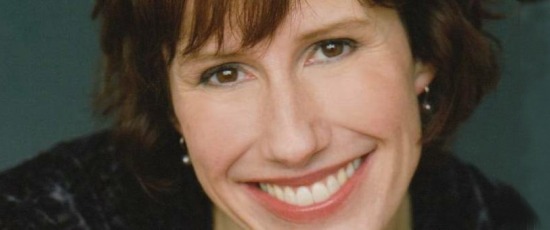 Interview: As central figure in William Brown-Doug Frew “To Master the Art” at Broadway Playhouse, Woditsch says she steered around caricature. Through Oct. 20.
Interview: As central figure in William Brown-Doug Frew “To Master the Art” at Broadway Playhouse, Woditsch says she steered around caricature. Through Oct. 20.
By Lawrence B. Johnson
“Terror is a good place to start,” Karen Janes Woditsch was saying about her beguiling performance as cooking icon Julia Child in “To Master the Art.” “And I started there. I added the ingredients of her character very slowly.”
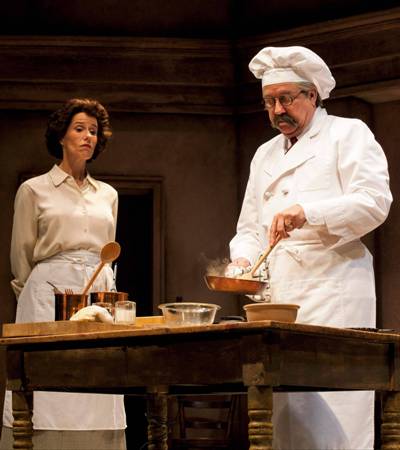 Woditsch’s take on Child is not, to use the actor’s word, a “caricature,” but rather a remarkable evocation of a brilliant, determined, trail-blazing woman who started literally from scratch to master the art of French cuisine and ended up changing the way Americans thought about making their meals.
Woditsch’s take on Child is not, to use the actor’s word, a “caricature,” but rather a remarkable evocation of a brilliant, determined, trail-blazing woman who started literally from scratch to master the art of French cuisine and ended up changing the way Americans thought about making their meals.
“There is something about playing this character that has allowed me to be emotionally bigger than I usually am,” says Woditsch. “I watched her television shows (on DVD) over and over. She had that high-pitched voice, a sort of gawkinesss, the way she’d throw her arms around – but also a great enthusiasm.
“She launched into things, not thinking about what she was going to look like (on television). People tend to behave more contained in certain situations. I don’t think Julia did. She was a big prankster when she was young. There was a bravura about her that gave me a great deal of freedom. She was boundless. When she said she was like a dog with a bone (learning the intricacies of French cooking), I’m sure she believed it. A big dog.”
The play’s run at the Broadway Playhouse reprises its world premiere in 2010 at TimeLine Theatre, which commissioned it from William Brown and Doug Frew. Woditsch created the role of Julia Child for the TimeLine premiere, and Brown directed both stagings as well.
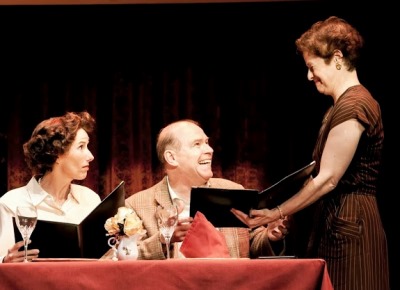 It isn’t the famous master of the art whom we first meet in this deliciously funny play, but a clueless Julia Child just arrived in France to join her husband Paul (Craig Spidle), who works for the U.S. State Department. They’re at a restaurant, about to order, this worldly man and the object of his devotion and passion, a lanky Californian who speaks no French and is quite agog at the whole scene around her. Somebody mentions shallots. What, Julia asks Paul, is a shallot?
It isn’t the famous master of the art whom we first meet in this deliciously funny play, but a clueless Julia Child just arrived in France to join her husband Paul (Craig Spidle), who works for the U.S. State Department. They’re at a restaurant, about to order, this worldly man and the object of his devotion and passion, a lanky Californian who speaks no French and is quite agog at the whole scene around her. Somebody mentions shallots. What, Julia asks Paul, is a shallot?
“That first scene is a gift for the entire play,” says Woditsch. “When I think of the whole arc of Julia Child, and how scary it could be getting from A to Z, the truth is that because of that first scene, the rest of play simply takes care of itself.
“All you have to do in that moment, as Julia, is receive. It’s beautiful. She’s bombarded with aromas. It’s Oh my God, Oh my God, Oh my God. I just sit back and go Wow! That’s a wonderful launch for an actor. From that point on, the story and the other actors help you a ton. I never really feel like I’m the central figure because everything is happening to me instead of me driving it.”
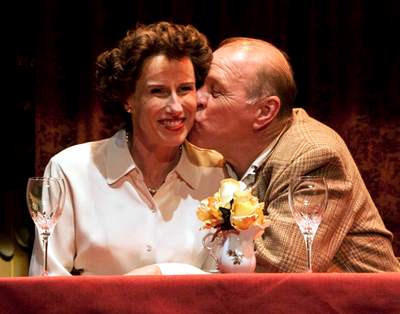 Modestly said. Woditsch is as funny as she is credible, the game American woman who plows headlong into the thrilling stimulus and daunting prejudice of culinary Paris. Both factors land her in the tutorial care of Chef Bugnard (Terry Hamilton) – in a basic course with a trio of ex-GI’s. The gatekeeper at the famous Cordon Bleu school (Janet Ulrich Brooks) sees neither point nor hope in Child’s application for admission. But to appease the American, Mme. Bressard assigns her to this rudimentary class: We catch a session on the proper way to scramble an egg. It is one of the play’s lasting pleasures.
Modestly said. Woditsch is as funny as she is credible, the game American woman who plows headlong into the thrilling stimulus and daunting prejudice of culinary Paris. Both factors land her in the tutorial care of Chef Bugnard (Terry Hamilton) – in a basic course with a trio of ex-GI’s. The gatekeeper at the famous Cordon Bleu school (Janet Ulrich Brooks) sees neither point nor hope in Child’s application for admission. But to appease the American, Mme. Bressard assigns her to this rudimentary class: We catch a session on the proper way to scramble an egg. It is one of the play’s lasting pleasures.
“Julia was a big flirt. She liked chattin’ up young guys – like my grandmother. She really enjoyed that she was in a class with GI’s. But in that scene, her reverence for Bugnard is the main ingredient. In this chef, she has found someone to look up to, someone intelligent and disciplined, more knowledgeable about cooking than she could ever hope to be. He’s the master, and to be schooled by the master spurs her enthusiasm and energy for the rest of the show. It’s all about doing it right, being precise, being French.
“There’s a lot of humor in this bit about making eggs, and no dialogue for a good chunk of time. But audiences are riveted, and everyone gives over to his command. It’s really important, the fact that Julia thanks Bugnard at the end of the scene. She suddenly understands the difference between cooking and an art form that happens to be food.”
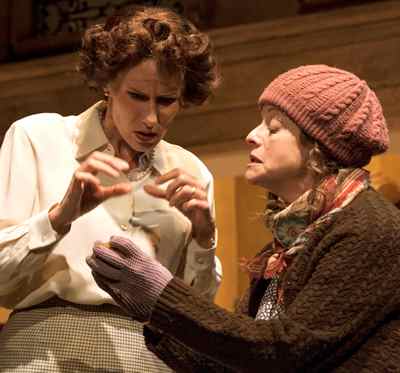 Nearly as close as Julia’s warm relationship with Paul, and no less endearing here, is her friendship with Simca (Jeannie Affelder), the French woman who would become co-creator of the landmark tome “Mastering the Art of French Cooking.”
Nearly as close as Julia’s warm relationship with Paul, and no less endearing here, is her friendship with Simca (Jeannie Affelder), the French woman who would become co-creator of the landmark tome “Mastering the Art of French Cooking.”
“What’s beautiful is that Julia and Simca are equally bull-headed,” says Woditsch. “You need just the right person to capture that, and I adore Jeannie. As an actress, she’s like Simca: She wants to get it right.
“Julia and Simca trust each other, but they come to the book project from two different angles. Simca wants it to be truly French and Julia wants it to be truly French but accessible. So they argue, heatedly.
“The relationship between Julia and Simca is written with a lot of charm. And here’s where Bill (Brown, the director) helped us. He kept reminding us that these are real people, and that their arguments get messy, really ugly. He would tell us, ‘You can’t have a nice argument. Don’t hold your punches. This book means everything and you’re convinced of your rightness, so have at each other.’”
But all those arguments, adds Woditsch, are based on respect and love.
“Jeannie and I love each other as actors and friends,” she says, “so we got to that level of intensity fairly easily.”
Becoming the American interloper who bridged the vast divide between classic French cooking and America’s post-war notion of the kitchen remains a nightly challenge for Woditsch.
“Before going on-stage, I listen to a little bit of her voice, those big vowel sounds. I say potatoes and boeuf bourguignon a lot. And I move around like I could crash into the furniture with great zeal.”
Related Links:
- Review of “To Master the Art”: Read it at ChicagoOntheAisle.com
- Performance location, dates and times: Details at TheatreinChicago.com
More Role Playing interviews:
- Ora Jones had to find her way into Katherine’s frayed world in ‘Henry VIII’
- Kareem Bandealy tapped roots, hit books for form warlord in ‘Blood and Gifts’
- Eva Barr explored two personas of Alzheimer’s victim to find center of ‘Alice’
- Darrell W. Cox sees theater’s core in closed-off teacher of ‘Burning Boy’
- Chaon Cross turned Court stage into a romper room finding answers in ‘Proof’
- Dion Johnstone turned outsider Antony to bloody purpose in ‘Julius Caesar’
- Noir films gave Justine Turner model for shadowy dame in ‘Dreadful Night’
- Anish Jethmalani plumbs agony of good man battling demons in ‘Bengal Tiger’
- Gary Perez channels his Harlem youth as quiet, unflinching Julio in ‘The Hat’
- Kamal Angelo Bolden sharpened dramatic combinations to play ‘The Opponent’
- In wheelchair, Jacqueline Grandt explores paralysis of neglect in ‘Broken Glass’
- James Ridge thrives in cold skin of Shakespeare’s smiling serpent, Richard III
- Stephen Ouimette brews an Irish tippler with a glassful of illusions in ‘Iceman’
- Ian Barford revels in the wiliness of an ambivalent rebel in Doctorow’s ‘March’
- Chuck Spencer flashes a badge of moral courage in Arthur Miller’s ‘The Price’
- Rebecca Finnegan finds lyrical heart of a lonely woman in ‘A Catered Affair’
- Bill Norris pulled the seedy bum in ‘The Caretaker” from a place within himself
- Diane D’Aquila creates a twice regal portrait as lover and monarch in ‘Elizabeth Rex’
- Dean Evans, in clown costume, enters the darkness of ‘Burning Bluebeard’
- Dan Waller wields a personal brush as uneasy genius of ‘Pitmen Painters’
- City boy Michael Stegall ropes wild cowboy in Raven Theatre’s ‘Bus Stop‘
- Brent Barrett is glad he joined ‘Follies’ as that womanizing, empty cad Ben
- Sadieh Rifai zips among seven characters in one-woman “Amish Project”
- Kirsten Fitzgerald inhabits sorrow, surfs the laughs in ‘Clybourne Park‘
- Janet Ulrich Brooks portrays a Russian arms negotiator in ‘A Walk in the Woods’
Tags: Broadway Playhouse, Craig Spidle, Doug Frew, Janet Ulrich Brooks, Jeannie Affelder, Karen Janes Woditsch, Terry Hamilton, To Master the Art, William Brown


No Comment »
8 Pingbacks »
[…] Karen Woditsch shapes vowels, flings arms to perfect portrait of Julia Child […]
[…] Karen Woditsch shapes vowels, flings arms to perfect portrait of Julia Child […]
[…] Karen Woditsch shapes vowels, flings arms to perfect portrait of Julia Child […]
[…] Karen Woditsch shapes vowels, flings arms to perfect portrait of Julia Child […]